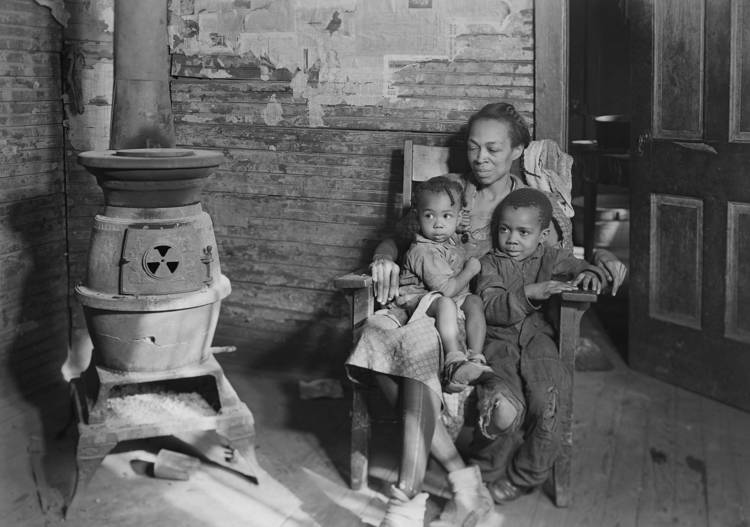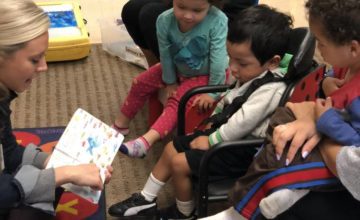Justin K. Scott, Cassandra Simons, Tanya Tavassolie, Laura Jimenez Parra, and Brenda Jones Harden, University of Maryland

Abstract
Racial discrimination has major implications for African American families and their young children. Considered to be an adverse childhood experience, persistent racial discrimination can lead to toxic stress, physiological changes in the body, and increased morbidity. In this article, the authors review how racial discrimination impacts the physical health and mental well-being of African American parents and their children from birth to preschool. They discuss implications for intervening with African American families to reduce the negative impact of racial discrimination.
But all our phrasing—race relations, racial chasm, racial justice, racial profiling, white privilege, even white supremacy—serves to obscure that racism is a visceral experience, that it dislodges brains, blocks airways, rips muscle, extracts organs, cracks bones, breaks teeth. You must never look away from this. You must always remember that the sociology, the history, the economics, the graphs, the charts, the regressions all land, with great violence, upon the body.
—Ta-Nehisi Coates, Between the World and Me
Discrimination is the unfair treatment of a person or group of people because of personal characteristics, such as race (Williams et al., 2019). Racism in the United States has gained public interest due to the sociopolitical climate and events of 2020 such as the murder of George Floyd and the Black Lives Matter movement. However, slavery, systemic racism, and discrimination in the United States have been contributing to disparities in developmental outcomes of African American children for centuries. Racial discrimination is considered a major social determinant of health (Trent et al., 2019), meaning that the many ways in which racism and discrimination are manifested in people’s daily lives, interactions with others, and communities can negatively impact the health of their bodies and minds, and can even be passed on to their young children.
In the US, African American children are placed at higher risk for infant mortality (Mathews & Driscoll, 2017), physical and mental health challenges (Auerbach et al., 2000; Poissant & Alexander, 2000), lower academic achievement (Barbarin & Soler, 1993; Neal, 2006), delinquent behavior (Jones Harden, 2008; Williams et al., 2007), and preschool and elementary school expulsion (Gilliam, 2005). These racial disparities signal an urgent need for researchers, practitioners, and policymakers to gain a better understanding of how to prevent the negative developmental impact of racism and discrimination. This article discusses how racial discrimination can impact the health and well-being of African American children and families, highlights research that documents evidence of discrimination linked to health disparities, and discusses implications for future research, policy, and practice.
Impact of Discrimination on African American Families
In a policy statement, the American Academy of Pediatrics (Trent et al., 2019) stated that racism is a major social determinant of health outcomes and called on practitioners and policymakers alike to work toward equality by reducing the negative effects of discrimination. They described three different forms of racism: (1) institutional/structure; (2) personally mediated; and (3) internalized (Trent et al., 2019). Most often, the literature has explored structural racism and personally mediated racism.
Families may be impacted by structural racism, or practices and policies in institutions such as government, education, and legal systems that unfairly advantage some groups but disadvantage and oppress other groups (Berry et al., 2021). Structural racism in the United States is largely responsible for inequalities in neighborhood and community quality, economic resources, and access to education and health care (Brown et al., 2019). Because the greater context of the environment within which children grow up influences nearly every aspect of their lives, structural racism can impact children by increasing their risk of exposure to childhood adversity (Seaton et al., 2018; Wade, 2015).
Further, families may be impacted by personally mediated racism, or racism in which individuals experience discrimination and prejudice about their ability, motives, or intent because of unfair perceived stereotypes about a racial group. Children may experience personally mediated racism directly through discriminatory behaviors targeted toward them by others, or they may experience it vicariously through discrimination imposed on their parents, caregivers, and other family members. Racial discrimination is experienced continuously by many African Americans starting early in life and continuing throughout adulthood (Williams & Mohammed, 2013). Adults report that experiencing racial discrimination causes them stress, frustration, depression, and anxiety (Pascoe & Smart Richman, 2009).
Scholars characterize these early experiences of racism and discrimination as an adverse childhood experience, or an experience that has significant detrimental impacts on children’s development, comparable to experiences of trauma, physical or sexual abuse, separation from parents, parent mental health problems, and parent substance use (Felitti et al., 1998). Exposure to early adversity has numerous consequences for mental and physical health and is a major contributor to health disparities in childhood and adulthood (Shonkoff et al., 2009). African American children growing up in low-income neighborhoods are already at risk for experiencing stress and then may experience additional adverse childhood experiences related to racial discrimination and associated negative developmental outcomes (Kim et al., 2020; Sampson et al., 2008; Sharkey & Elwert, 2011). Persistent, long-term exposure to racial discrimination contributes to inequalities in health across the lifespan (Paradies et al. 2015; Phelan & Link, 2015).

Slavery, systemic racism, and discrimination in the United States have been contributing to disparities in developmental outcomes of African American children for centuries. Photo: Everett Collection/shutterstock
How exactly does stress from racial discrimination affect the body? Scholars have proposed a biodevelopmental framework for understanding how chronic stress becomes embedded in the body by making physical changes to physiology over time (Shonkoff et al., 2009). When a normal stress response occurs, children’s physiology becomes activated and aroused to motivate behavior. Through the context of supportive parenting, children can learn to navigate the stressful behavior and regulate their physiological reactions, which is central to their development of emotional and behavioral self-regulation skills (Evans & Kim, 2007). When stress is unmanageable and persistent, however, it can become toxic stress, in which the repeated activation of heightened emotion and stress responses leads to changes in brain structure, damage to neuroendocrine organ systems, and ultimately results in maladaptive psychophysiological processes and heightened emotional reactivity (Gibbons & Stock, 2017).

Children may experience personally mediated racism directly through discriminatory behaviors targeted toward them by others, or they may experience it vicariously through discrimination imposed upon their parents, caregivers, and other family members. Photo: KMLynch/shutterstock
Children exposed to toxic stress have higher rates of physical injuries and illnesses (Blair & Raver, 2012; Shonkoff et al., 2012), and when toxic stress occurs over a lifetime (Shonkoff et al., 2009), it has numerous implications for health in adulthood, including mental health and daily functioning. The effects of toxic stress on the body have been likened to weathering, as if the stress experienced over time slowly chips away at one’s physical health (Geronimus, 1992). Weathering of the body has been documented in African American women who experience more pregnancy complications, higher morbidity in middle adulthood, earlier mortality (Geronimus et al., 2006), and persistent health disparities across the life course (Forde et al., 2019). Through this weathering of the physical body, stress from discrimination can affect the pregnancy process, leading to worse birth outcomes and compromised infant health (Geronimus et al., 2006, 2007; Martin et al., 2018). Toxic stress from racial discrimination experienced by parents may also be transferred to children through parental functioning. Persistent experiences of discrimination can increase rates of depression and anxiety in parents (Heard-Garris et al., 2018), leading to compromised parenting practices.
Discrimination and Developmental Outcomes for Young Children
Racial discrimination and its adverse impacts on the psychological well-being of African American children and adults is becoming well-documented (Berry et al., 2021). Because of the numerous ways that toxic stress from persistent racial discrimination influences physical health and mental health well into adulthood, and thus influences the behaviors parents use with their children, racial discrimination has negative consequences for children’s development through several pathways. This section highlights evidence of the effects of discrimination on children’s physical, mental, and behavioral health throughout early childhood.
Perinatal Period
An increasing body of literature suggests racial discrimination may contribute to the inequalities in birth outcomes experienced by African American mothers when compared to their European American counterparts in the United States (Alhusen et al., 2016; Black et al., 2015). Perceived racial discrimination during pregnancy may increase the risk of adverse birth outcomes. For example, Mustillo et al. (2004) found that women who reported experiences of racial discrimination during their pregnancy were 3 times more likely to have a preterm birth and 5 times more likely to have a low-birthweight delivery compared to women who did not report any of these experiences. Similarly, prenatal perceptions of discrimination significantly predicted prematurity and low birthweight in low-income African American mothers engaged in Early Head Start and Women, Infants, and Children programs (Jones Harden, 2021).
Lifetime experiences of racial discrimination also appear to contribute to adverse birth outcomes. For example, perceptions of racism during childhood significantly predicted low birthweight in infants of African American women but not European American women (Dominguez et al., 2008). Examining racial discrimination among African American women at different stages of their life, Daniels et al. (2020) found that direct experiences of discrimination during adolescence were associated with a 48% increase in the odds of preterm labor in African American mothers and second-hand experiences of lifetime discrimination were related to a 45% increase in the odds of preterm labor.
The limited research on the pathways by which racial discrimination influences these outcomes suggests multiple factors whereby discrimination impairs mothers’ mental health (Giurgescu et al., 2011). Maternal perceptions of racial discrimination as a form of chronic stress during pregnancy may be a risk factor for adverse birth outcomes (Black et al., 2015). This chronic stress may be manifested as symptoms of depression and anxiety. Everyday discrimination has been significantly associated with an increase in maternal depressive symptoms in African American and Latinx women, which in turn was related to infants’ lower birth weight (Earnshaw et al., 2013). Among a large sample of African American and White women, chronic worry about racial discrimination across a lifetime was highest among African American women of higher income and education levels; this worry was a significant risk factor for preterm birth (Braveman et al., 2017). In a sample of low-income African American women, discrimination during pregnancy was related to both more prenatal depressive symptoms and feeling unattached to their unborn children (Jones Harden, 2021), which was more pronounced for mothers experiencing the greatest socioeconomic risk.
Research has also highlighted physical health and prenatal health behaviors as mechanisms through which discrimination impacts birth outcomes (Black et al., 2015). One study found that, compared to White mothers, African American mothers who experienced discrimination showed significant levels of antibody markers across pregnancy that were indicative of stress-induced immune system dysregulation (Christianet al., 2012). Everyday discrimination experienced during pregnancy has also been linked to compromising health behaviors, including higher rates of alcohol and tobacco use during pregnancy (Bennett et al., 2010), as well as delaying prenatal care until the third trimester or not receiving prenatal care at all (Slaughter-Acey et al., 2019).
Infancy and Toddlerhood
Although relatively few studies have examined the specific effects of perceived discrimination on infant and toddler outcomes, the current evidence demonstrates a link between racial discrimination and poorer infant social–emotional outcomes (Berry et al., 2021). Rosenthal et al. (2018) found that low-income Black and Latinx mothers’ experiences of everyday discrimination during pregnancy predicted greater infant distress when separating from caregivers and more negative emotionality at 6 months and 1 year old, controlling for sociodemographic factors. Maternal experiences of racial discrimination have also been tied to infant and toddler health outcomes such as sleep duration (Powell et al., 2020). Compared to their counterparts who reported no lifetime discrimination, women of color who reported discrimination had babies with significantly shorter sleep durations from ages 6 to 24 months old. Mothers’ perceived discrimination has also been linked to lower infant performance on measures of cognitive and gross motor skills at 4- to 6-months old (Jones Harden, 2021). As children age, the impact of mothers’ perceived discrimination carries forward to predict greater externalizing behavior problems in children ages 2–4 years old (Jones Harden, 2021).

Lifetime experiences of racial discrimination also appear to contribute to adverse birth outcomes. Photo: Damon Yancy/shutterstock
During infancy and toddlerhood, children mainly experience racism indirectly through its effects on their parents’ well-being and parenting practices (Berry et al., 2021; Garcia Coll et al., 1996; Seaton et al., 2018). Consistent with family stress theory, many analyses demonstrate that discrimination impacts children’s outcomes indirectly, often through maternal depression (Rosenthal et al., 2018). Depressive symptoms are a well-known contributor to parents’ stress and ability to choose effective parenting strategies when under pressure (Dix & Moed, 2019). Discrimination has been tied directly to greater depressive symptoms in several studies and has been a major explanatory factor for the relation between parents’ discrimination experiences and their children’s cognitive and behavioral outcomes (Jones Harden, 2021; Rosenthal et al., 2018). In one study of low-income African American mothers, the link between mothers’ experiences of discrimination and their children’s externalizing behavior problems was explained by mothers’ having greater levels of depressive symptoms and parenting stress (Jones Harden, 2021).
Preschool
Research on how parental experiences of racism predict health and behavioral outcomes for preschool aged children is relatively novel and still ongoing. There is emerging research that parents’ perception of discrimination is related to young children’s internalizing (Anderson et al., 2015) and externalizing (Jones Harden, 2021) problems. Extant research has shown that experiences of discrimination in early childhood have potentially lasting negative effects on adolescent behavior (Savell et al., 2019). Further, parent-reported experiences of racism and discrimination also affect children’s brain functioning and stress response processes. Children 4–9 years old whose mothers reported experiences of discrimination had elevated levels of salivary interleukin-6, a biomarker of toxic stress (Condon et al., 2019).
Young children mainly experience stress through vicarious exposure to discrimination experienced by their caregivers (Heard-Garris et al., 2018). Although researchers know little about the mechanisms through which parental exposure to discrimination influence children’s behavioral and health outcomes, some research suggests that this pathway is poor parental functioning that manifests in the form of maternal depressive symptoms and parenting stress (Anderson et al., 2015; Jones Harden, 2021) and more compromised parenting practices, including decreased responsiveness and discrimination (Jones Harden, 2021). There is also research suggesting the neighborhood that families live in can affect their experiences of discrimination. Parents who report increased fear of victimization in their communities reported increased internalizing problems and depressive symptoms in their preschool-aged children (Caughy et al., 2004).
Research has shown that parents utilize a number of strategies to mitigate or buffer against the negative effects of discrimination on child outcomes. Parents who report actively contending with experiences of racism, confronting perpetrators of racism, or taking action against racism also report fewer behavioral problems in their children (Caughy et al., 2004). Parental racial identity has also been shown to be important for reducing the negative impacts of exposure to racism. When Black mothers have a strong sense of racial identity and report feeling connected to Black culture and values their preschool aged children have stronger social skills (Halgunseth et al., 2005). This finding suggests that when parents have positive racial identities, discuss their experiences, and take actions, they can potentially protect their children from the negative effects of exposure to discrimination.
Implications of Racial Discrimination for Child and Family Policy and Practice
To mitigate the health and developmental disparities wrought by structural racism and discriminatory practices, it is critical to devise and improve social policies with an aim to promote racial equity. For example, policies in disparate areas such as education, housing, criminal justice, and income supports act to sustain the racial disparities that have existed since individuals of African descent were brought to the Americas as slaves (Brown et al., 2019). Adaptations to the regulations for and implementation of these policies has the potential to reduce disparities that are the consequence of structural racism (Brown et al., 2019). In addition, income support programs, such as Temporary Assistance for Needy Families and the recent Child Tax Credit, could be altered to facilitate equitable access to such programs across racial and geographic groups (McDaniel et al., 2017). Explicitly in the early childhood sphere, policies that ensure that children from all racial backgrounds have access to high-quality early childhood education, such as Head Start, Early Head Start, and the Child Care Development Fund, are essential (Meek et al., 2020). Further, the delivery of these early childhood education programs should be grounded in a race equity approach, including the implementation of curricula, child assessment, monitoring and accountability systems, as well as workforce hiring, training, supervision, and compensation processes (Meek et al., 2020).

Research on how parental experiences of racism predict health and behavioral outcomes for preschool aged children is relatively novel and still ongoing. Photo: Ginny Thomas/shutterstock
As discussed previously, discrimination exacts its toll on young children via its impact on parental well-being and associated parenting behaviors. Thus, to address the effects of discrimination on young children, a two-generation approach is critical. Early childhood education, home visiting, and parenting programs have to prioritize support to families to navigate the policies and programs that will improve their well-being. These programs should incorporate interventions to address parents’ psychological well-being, particularly in domains that are known to be affected by racism and discrimination, such as depression and parental stress (Ammerman et al., 2013). Further, strategies that directly address parents’ perceptions of and reactions to racism and discrimination should be integrated into family support programs. Supporting parents in this manner has the potential to enhance parents’ capacity to cope with and confront these practices in their everyday lives, which may affect how they parent their children and subsequent child outcomes (Condon et al., 2021; Keyes et al., 2015). Finally, parenting interventions should explicitly address parenting practices that are a consequence of parental experiences of racism and discrimination (e.g., depression, stress), such as decreased responsiveness and stimulation (Jones Harden, 2021). Interventions that target such parenting practices enable young children to receive the sensitive and supportive parenting that may serve to protect them from the vestiges of racism and discrimination, and generally promote positive developmental outcomes.
In closing, there is emerging evidence that racism and discrimination have pernicious effects on young children, primarily through their impacts on parental well-being and parenting practices. Policies and practices that specifically address structural racism and discriminatory behaviors are needed to support parents to contend with these negative experiences while buffering their young children against their adverse consequences. These should be grounded in a comprehensive programmatic approach, which builds on the evidence of the effectiveness of high-quality early childhood education, early childhood home visiting, and parenting interventions that aim to provide young children with the contexts that facilitate their optimal health and developmental outcomes.
Author Bios
Justin K. Scott, PhD, is a postdoctoral fellow in the School of Social Work, University of Maryland Baltimore. He holds a doctorate in human development and family sciences from the University of Texas at Austin. His research examines how parents’ social cognition about child rearing and emotion regulation during parenting influences parents’ discipline strategies and children’s behavioral development.
Cassandra Simons, PhD, is a postdoctoral research fellow in the Department of Human Development and Quantitative Methodology, University of Maryland College Park. She holds a doctorate in applied developmental psychology from the University of Maryland, Baltimore County. Her research investigates how caregiver beliefs and practices influence young children’s social–emotional development and early learning.
Tanya Tavassolie, PhD, is a postdoctoral research fellow in the Department of Human Development and Quantitative Methodology, University of Maryland College Park. She holds a doctorate in applied developmental psychology from George Mason University. Her research examines the effects of elementary school test-based promotion policies on low-income ethnically and linguistically diverse populations.
Laura Jimenez Parra is a doctoral candidate in the Department of Human Development and Quantitative Methodology, University of Maryland College Park. Her research centers around prevention and intervention programs, including parenting interventions and early childhood education, and their effects on the development of infants, toddlers, and preschool children.
Brenda Jones Harden, PhD, is the Alison Richman Professor for Children and Families in the School of Social Work, University of Maryland Baltimore. She holds a doctorate in developmental clinical psychology from Yale University. She directs the Prevention and Early Adversity Research Laboratory, where she and her research team examine the developmental and mental health needs of young children who have experienced early adversity, particularly those who have been maltreated or have experienced other forms of trauma.
Suggested Citation
Scott, J. K., Simons, C., Tavassolie, T., Parra, L. J., & Jones Harden, B. (2021). Racial discrimination and parenting: Implications for intervening with African American children and families. ZERO TO THREE Journal, 42(1), 18–25.
References
Alhusen, J. L., Bower, K. M., Epstein, E., & Sharps, P. (2016). Racial discrimination and adverse birth outcomes: An integrative review. Journal of Midwifery & Women’s Health, 61(6), 707–720. https://doi.org/10.1111/jmwh.12490
Ammerman, R. T., Putnam, F. W., Altaye, M., Teeters, A. R., Stevens, J., & Van Ginkel, J. B. (2013). Treatment of depressed mothers in home visiting: Impact on psychological distress and social functioning. Child Abuse & Neglect, 37(8), 544–554.
Anderson, R. E., Hussain, S. B., Wilson, M. N., Shaw, D. S., Dishion, T. J., & Williams, J. L. (2015). Pathways to pain: Racial discrimination and relations between parental functioning and child psychosocial well-being. Journal of Black Psychology, 41(6), 491–512.
Auerbach, J. A., Krimgold, B. K., & Lefkowitz, B. (2000). Improving health: It doesn’t take a revolution (No. 298). National Policy Association.
Barbarin, O. A., & Soler, R. E. (1993). Behavioral, emotional, and academic adjustment in a national probability sample of African American children: Effects of age, gender, and family structure. Journal of Black Psychology, 19(4), 423–446.
Bennett, I. M., Culhane, J. F., Webb, D. A., Coyne, J. C., Hogan, V., Mathew, L., & Elo, I. T. (2010). Perceived discrimination and depressive symptoms, smoking, and recent alcohol use in pregnancy. Birth, 37(2), 90–97. https://doi.org/10.1111/j.1523-536X.2010.00388.x
Berry, O. O., Londoño Tobón, A., & Njoroge, W. F. M. (2021). Social determinants of health: The impact of racism on early childhood mental health. Current Psychiatry Reports, 23(5), 1–10. https://doi.org/10.1007/s11920-021-01240-0
Black, L., Johnson, R., & VanHoose, L. (2015). The relationship between perceived racism/discrimination and health among Black American women: A review of the literature from 2003 to 2013. Journal of Racial and Ethnic Health Disparities, 2, 11–20. https://doi.org/10.1007/s11920-021-01240-0
Blair, C., & Raver, C. C. (2012). Child development in the context of adversity: Experiential canalization of brain and behavior. American Psychologist, 67(4), 309–318. https://doi.org/10.1037/a0027493
Braveman, P., Heck, K., Egerter, S., Dominguez, T. P., Rinki, C., Marchi, K. S., & Curtis, M. (2017). Worry about racial discrimination: A missing piece of the puzzle of Black-White disparities in preterm birth? PLoS ONE, 12(10), e0186151. https://doi.org/10.1371/journal.pone.0186151
Brown, S., Steven, Kijakazi, K., Runes, C., & Turner, M. A. (2019). Confronting
structural racism in research and policy analysis. The Urban Institute.
Caughy, M. O. B., O’Campo, P. J., & Muntaner, C. (2004). Experiences of racism among African American parents and the mental health of their preschoolaged children. American Journal of Public Health, 94(12), 2118–2124.
Christian, L. M., Iams, J. D., Porter, K., & Glaser, R. (2012). Epstein-Barr virus reactivation during pregnancy and postpartum: Effects of race and racial discrimination. Brain, Behavior, and Immunity, 26(8), 1280–1287. https://doi.org/10.1016/j.bbi.2012.08.006
Condon, E. M., Barcelona, V., Ibrahim, B. B., Crusto, C. A., & Taylor, J. Y. (2021). Racial discrimination, mental health, and parenting among African American mothers of preschool-aged children. Journal of the American Academy of Child & Adolescent Psychiatry. Advance online publication. https://doi.org/10.1016/j.jaac.2021.05.023
Condon, E. M., Holland, M. L., Slade, A., Redeker, N. S., Mayes, L. C., & Sadler, L. S. (2019). Associations between maternal experiences of discrimination and biomarkers of toxic stress in school-aged children. Maternal and Child Health Journal, 23(9), 1147–1151. https://doi.org/10.1007/s10995-019-02779-4
Daniels, K. P., Valdez, Z., Chae, D. H., & Allen, A. M. (2020). Direct and vicarious racial discrimination at three life stages and preterm labor: Results from the African American Women’s Heart & Health Study. Maternal and Child Health Journal, 24(11), 1387–1395. https://doi.org/10.1007/s10995-020-03003-4
Dix, T., & Moed, A. (2019). Parenting and depression. In M. H. Bornstein (Ed.), Handbook of parenting: Vol. 4. Social conditions and applied parenting, (3rd ed., pp. 449–482). Routledge.
Dominguez, T. P., Dunkel-Schetter, C., Glynn, L. M., Hobel, C., & Sandman, C. A. (2008). Racial differences in birth outcomes: The role of general, pregnancy, and racism stress. Health Psychology, 27(2), 194–203. https://doi.org/10.1037/0278-6133.27.2.194
Earnshaw, V. A., Rosenthal, L., Lewis, J. B., Stasko, E. C., Tobin, J. N., Lewis, T. T., Reid, A. E., & Ickovics, J. R. (2013). Maternal experiences with everyday discrimination and infant birth weight: A test of mediators and moderators among young, urban women of color. Annals of Behavioral Medicine, 45(1), 13–23. https://doi.org/10.1007/s12160-012-9404-3
Evans, G. W., & Kim, P. (2007). Childhood poverty and health: Cumulative risk exposure and stress dysregulation. Psychological Science, 18(11), 953–957.
Felitti, V. J., Anda, R. F., Nordenberg, D., Williamson, D. F., Spitz, A. M., Edwards, V., Koss, M. P., & Marks, J. S. (1998). Relationship of childhood abuse and household dysfunction to many of the leading causes of death in adults: The Adverse Childhood Experiences (ACE) Study. American
Journal of Preventive Medicine, 14(4), 245–258. https://doi.org /10.1016/S0749-3797(98)00017-8
Forde, A. T., Crookes, D. M., Suglia, S. F., & Demmer, R. T. (2019). The weathering hypothesis as an explanation for racial disparities in health: A systematic review. Annals of Epidemiology, 33, 1–18. https://doi.org/10.1016/j.annepidem.2019.02.011
García Coll, C., Crnic, K., Lamberty, G., Wasik, B. H., Jenkins, R., Garcia, H. V., & McAdoo, H. P. (1996). An integrative model for the study of developmental competencies in minority children. Child Development, 67(5), 1891–1914. https://doi.org/10.1111/j.1467-8624.1996.tb01834.x
Geronimus, A. T. (1992). The weathering hypothesis and the health of African-American women and infants: Evidence and speculations. Ethnicity & Disease, 2(3), 207–221.
Geronimus, A. T., Bound, J., Keene, D., & Hicken, M. (2007). Black-White differences in age trajectories of hypertension prevalence among adult women and men, 1999–2002. Ethnicity & Disease, 17(1), 40–49.
Geronimus, A. T., Hicken, M., Keene, D., & Bound, J. (2006). “Weathering” and age patterns of allostatic load scores among Blacks and Whites in the United States. American Journal of Public Health, 96(5), 826–833. https://ajph.aphapublications.org/doi/10.2105/AJPH.2004.060749
Gibbons, F. X., & Stock, M. L. (2017). Perceived racial discrimination and health behavior: Mediation and moderation. In B. Major, J. Dovidio, & B. Link (Eds.), The Oxford handbook of stigma, discrimination, and health (pp. 355–377). Oxford University Press.
Gilliam, W. S. (2005). Prekindergarteners left behind: Expulsion rates in state prekindergarten systems. Foundation for Child Development.
Giurgescu, C., McFarlin, B. L., Lomax, J., Craddock, C., & Albrecht, A. (2011). Racial discrimination and the Black-White gap in adverse birth outcomes: a review. Journal of Midwifery & Women’s Health, 56(4), 362–370. https://doi.org/10.1111/j.1542-2011.2011.00034.x
Halgunseth, L. C., Ispa, J. M., Csizmadia, A., & Thornburg, K. R. (2005). Relations among maternal racial identity, maternal parenting behavior, and child outcomes in low-income, urban, Black families. Journal of Black Psychology, 31(4), 418–440. https://doi.org/10.1177/0095798405275272
Heard-Garris, N. J., Cale, M., Camaj, L., Hamati, M. C., & Dominguez, T. P. (2018). Transmitting trauma: A systematic review of vicarious racism and child health. Social Science & Medicine, 199, 230–240. https://doi.org/10.1016/j.socscimed.2017.04.018
Jones Harden, B. (2008). Inequities in infancy: The overrepresentation of African American infants in the child welfare system. ZERO TO THREE Journal, 28(6), 5–12.
Jones Harden, B. (2021, April 27). Racial discrimination and parenting: Implications for intervening with African American infants and families. ZERO TO THREE Scientific Meeting, Washington, DC.
Keyes, A. W., Smyke, A. T., Middleton, M., & Black, C. L. (2015). Parenting African American children in the context of racism. ZERO TO THREE Journal, 35(4), 27–34.
Kim, H. G., Kuendig, J., Prasad, K., & Sexter, A. (2020). Exposure to racism and other adverse childhood experiences among perinatal women with moderate to severe mental illness. Community Mental Health Journal, 56(5), 867–874. https://doi.org/10.1007/s10597-020-00550-6
Martin J. A., Hamilton, B. E., Osterman, J. K., Driscoll, A. K., & Drake, P. (2018). Births: Final data for 2016. National Vital Statistics Reports, 67(1). National Center for Health Statistics.
Mathews, T. J., & Driscoll, A. K. (2017). Trends in infant mortality in the United States, 2005–2014. Centers for Disease Control and Prevention.
McDaniel, M., Woods, T., Pratt, E., & Si mms, M. (2017). Identifying racial and ethnic disparities in human services. Urban Institute.
Meek, S., Iruka, I. U., Allen, R., Yazzie, D., Fernandez, V., Catherine, E., McIntosh, K., Gordon, L., Gilliam, W., Hemmeter, M. L., Blevins, D., & Powell, T. (2020). Start with equity: Fourteen priorities to dismantle systemic racism in early care and education. The Children’s Equity Project.
https://childandfamilysuccess.asu.edu/cep/initiatives/start-with-equity-14-
priorities-dismantle-systemic-racism-early-care-education
Mustillo, S., Krieger, N., Gunderson, E. P., Sidney, S., McCreath, H., & Kiefe, C. I. (2004). Self-reported experiences of racial discrimination and Black–White differences in preterm and low-birthweight deliveries: The CARDIA study. American Journal of Public Health, 94(12), 2125–2131. https://doi.org/10.2105/AJPH.94.12.2125
Neal, D. (2006). Why has Black-White skill convergence stopped? In E. Hanushek & F. Welch (Eds.), Handbook of the economics of education (pp. 511–576). North-Holland.
Paradies, Y., Ben, J., Denson, N., Elias, A., Priest, N., Pieterse, A., Gupta, A., Kelaher, M., & Gilbert, G. (2015). Racism as a determinant of health: A systematic review and meta-analysis. PLoS ONE, 10(9), 1–48. https://doi.org/10.1371/journal.pone.0138511
Pascoe, E. A., & Smart Richman, L. (2009). Perceived discrimination and health: A meta-analytic review. Psychological Bulletin, 135(4), 531–554. https://doi.org/10.1037/a0016059
Phelan, J. C., & Link, B. G. (2015). Is racism a fundamental cause of inequalities in health? Annual Review of Sociology, 41, 311–330. https://doi.org./10.1146/annurev-soc-073014-112305
Poissant, A. F., & Alexander, A. (2000). Lay my burden down: Unraveling suicide and the mental health crisis among African-Americans. Beacon Press.
Powell, C. A., Rifas-Shiman, S. L., Oken, E., Krieger, N., Rich-Edwards, J. W., Redline, S., & Taveras, E. M. (2020). Maternal experiences of racial discrimination and offspring sleep in the first 2 years of life: Project Viva cohort, Massachusetts, USA (1999–2002). Sleep Health, 6(4), 463–468.
https://doi.org/10.1016/j.sleh.2020.02.002
Rosenthal, L., Earnshaw, V. A., Moore, J. M., Ferguson, D. N., Lewis, T. T., Reid, A. E., Lewis, J. B., Stasko, E. C., Tobin, J. N., & Ickovics, J. R. (2018). Intergenerational consequences: Women’s experiences of discrimination in pregnancy predict infant social-emotional development at 6 months and 1 year. Journal of Developmental and Behavioral Pediatrics, 39(3), 228–237.
Sampson, R. J., Sharkey, P., & Raudenbush, S. W. (2008). Durable effects of concentrated disadvantage on verbal ability among African-American children. Proceedings of the National Academy of Sciences, 105(3), 845–852. https://doi.org/10.1073/pnas.0710189104
Savell, S. M., Womack, S. R., Wilson, M. N., Shaw, D. S., & Dishion, T. J. (2019). Considering the role of early discrimination experiences and the parent–child relationship in the development of disruptive behaviors in adolescence. Infant Mental Health Journal, 40(1), 98–112. https://doi.org/10.1002/imhj.21752
Seaton, E. K., Gee, G. C., Neblett, E., & Spanierman, L. (2018). New directions for racial discrimination research as inspired by the integrative model. American Psychologist, 73(6), 768–780.
Sharkey, P., & Elwert, F. (2011). The legacy of disadvantage: Multigenerational neighborhood effects on cognitive ability. American Journal of Sociology, 116(6), 1934–1981. https://doi.org/10.1086/660009
Shonkoff, J., Boyce, W., & McEwen, B. (2009). Neuroscience, molecular biology, and the childhood roots of health disparities: Building a new framework for health promotion and disease prevention. Journal of the American Medical Association, 301(21), 2252–2259. https://doi.org/10.1001/jama.2009.754
Shonkoff, J. P., Garner, A. S., Siegel, B. S., Dobbins, M. I., Earls, M. F., Garner, A. S., McGuinn, L., Pascoe, J., & Wood, D. L. (2012). The lifelong effects of early childhood adversity and toxic stress. Pediatrics, 129(1), e232–e246. https://doi.org/10.1542/peds.2011-2663
Slaughter-Acey, J. C., Sneed, D., Parker, L., Keith, V. M., Lee, N. L., & Misra, D. P. (2019). Skin tone matters: Racial microaggressions and delayed prenatal care. American Journal of Preventive Medicine, 57(3), 321–329. https://doi.org/10.1016/j.amepre.2019.04.014
Trent, M., Dooley, D. G., & Dougé, J. (2019). The impact of racism on child and adolescent health. Pediatrics, 144(2). https://doi.org/10.1542/peds.2019-1765
Wade, P. (2015). Racism and liberalism: The dynamics of inclusion and exclusion. Ethnic and Racial Studies, 38(8), 1292–1297.
Williams, J., Hovmand, P., & Bright, C. (2007). Overrepresentation of African Americans incarcerated for delinquency offenses in juvenile institutions. In D. Springer & A. Roberts (Eds.), Handbook of forensic mental health with victims and offenders: Assessment, treatment, and research (pp. 363–381). Springer.
Williams, D. R., Lawrence, J. A., & Davis, B. A. (2019). Racism and health: Evidence and needed research. Annual Review of Public Health, 40, 105–125. https://doi.org/10.1146/annurev-publhealth040218-043750
Williams, D. R., & Mohammed, S. A. (2013). Racism and health I: Pathways and scientific evidence. American Behavioral Scientist, 57(8), 1152–1173. https://doi.org/10.1177/0002764213487340




